Search results for "jarkko/2011/04/2010/05/song-without-words"
Finlandia Junior Prize 2010
26 November 2010 | In the news
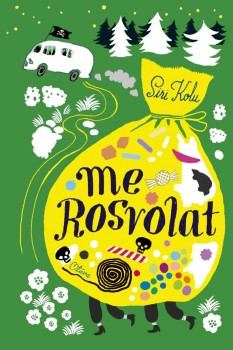 The Finlandia Junior Prize has gone to author Siri Kolu and illustrator Tuuli Juusela for the novel Me Rosvolat (‘Me and the Robbersons’, Otava); they will share the award of €30,000 (see the Prize jury assessments of the shortlist here). The winner was chosen by actor and writer Hannu-Pekka Björkman.
The Finlandia Junior Prize has gone to author Siri Kolu and illustrator Tuuli Juusela for the novel Me Rosvolat (‘Me and the Robbersons’, Otava); they will share the award of €30,000 (see the Prize jury assessments of the shortlist here). The winner was chosen by actor and writer Hannu-Pekka Björkman.
Awarding the prize on 25 November he said: ‘It caught my attention that in none of the six shortlisted children’s books are there any so-called nuclear families, at least not for long. The main characters constantly live and grow without something – the lack of parents or the attention of an adult is a serious matter to a child. However, in these books there is always someone who cares, not perhaps a stereotypical mom or dad, but an adult nevertheless.’ In Björkman’s opinion Me Rosvolat, with its rich language and a whiff of anarchy, presents the reader with moments of realisation and wonderment.
The last melody
30 September 1995 | Archives online, Fiction, Prose
Extracts from the novel Kadotettu puutarha (‘The lost garden’, WSOY, 1995). Introduction by Riina Katajavuori
Their sojourn at the villa extended into the autumn of 1944; the schools did not go back as usual on the first of September. Repair of the university buildings progressed rapidly; the work had begun immediately after the bombing. The Doctor went to town from time to time, but nothing bound the family to it, and he returned to his desk in the attic room and to his solitary walks by the lake. His heart troubled him from time to time. It did not like these walks, did not like exertion; but he had succeeded in concealing the matter from Elisabet. After one particular attack, he had secretly seen a doctor in town, and now, instead of camphor tablets, he always had those little buttons in his pocket, the breast pocket of his waistcoat. He swallowed one from time to time on these expeditions, a pain in his wrists and his eyes staring dimly at a clump of ferns that seemed to have become hazy, or a tree-top that seemed to be falling toward him. He did not wish Elisabet to know. Not this, in Elisabet’s world, not this, in air that was suffused with grief for their dead son Leo, with well controlled and beautifully expressed emotion, with concern for the remaining boy, who was there, on the frontier, with the burdensome and universal tragedy that filled the air as light filled it in daytime. More…
Briefcase man
31 December 2000 | Archives online, Fiction, Prose
Extracts from the novel Aura (Otava, 2000). Introduction by Mervi Kantokorpi
He was born in the Russian Grand Duchy of Finland the year the world caught fire. He learned to read the year of the revolution, and spoke two languages as his mother tongue border – language and enemy language, as he often used to say. He was proud of only one of his languages; the other, he loved secretly. He spoke one loudly, the other softly, almost in a whisper.
At night, on the telephone, he spoke far away – you could see it, even in the dark, from his expression, his half-closed eyes sometimes breaking into song. It was so beautiful and soft that I wept under the blankets and hated myself because of the effect that language had on me.
Stinking tinker Karelian trickster Russian drinker, little Russky’s dancing in a leather skirt, skirt tears and oh! little Russky’s hurt.
Count to ten, he said. But count in Finnish. Or Swedish, that’ll baffle them. And if they call you a Swedish bastard, it’s not so bad. I’ve taught you the numbers in Arabic and Spanish, too, but I don’t think you’ll be able to remember them yet. More…
The strike
13 December 1980 | Archives online, Fiction, Prose
An extract from Täällä Pohjantähden alla (‘Here beneath the North Star’), chapter 3, volume II. Introduction by Juhani Niemi
With banners held aloft, the procession of strikers moved towards the Manor. It was known that the strikebreakers had arrived early and that the district constable was with them. Just before reaching the field the marchers struck up a song, and they went on singing after they had halted at the edge of the field. The men at work in the field went on with their tasks, casting occasional furtive glances at the strikers. Nearest to the road stood the Baron and the constable. Uolevi Yllö’s head was bandaged: someone had attacked him with a bicycle chain as he left the field at dusk the evening before. Arvo Töyry was in the field too, the landowners having agreed that those who had got their own harrowing and sowing done should lend the others a hand. Not all the men in the field were known to the strikers. The son of the district doctor was there they noticed, and the sons of several of the village gentry, as well as the men from the smallholdings. More…
It takes a life to say
31 December 2007 | Archives online, Fiction, poetry
Poems, published in You go the words (Action Books, Scandinavian Series, Indiana, 2007). Introduction by Trygve Söderling
|
We go and search it is not words * You go the * And spread out To only * The song * One time I have a name * a longing * A morning’s * Words are words But word’s image Alas stay not * Fly out, my day
fly, fly day to meet
fly, fly, you the wretched's
their, everyone's
in all times
peace and day
on ground's floor
floor ground
o you
in man's name
* Suneveningspring * Dog bolts happy * And to not speak more it takes a life to say but – as the everyday moment O no beauty But your light – a smile what and to know * And allthesame The white day * |
Vi går och söker det är ej ord * Du går de * Och bredd ut Att endast * Sången * En gång Jag har ett namn * en längtan * En morgons * Ord är ord Men ords bild Ack stanna ej * Flyg ut, min dag
flyg, flyg dag till möte
flyg, flyg, du de armas
deras, allas
i alla tider
lugn och dag
på marks golv
golv mark
o du
i människans namn
* Solaftonvår * Hund skenar glad * Och att ej tala mer det tar ett liv att säga men – som vardagens stund O ingen skönhet Men ditt ljus – ett leende vad och att veta * Och alltjämt Den vita dag * |
Translated by Fredrik Hertzberg
The Finlandia prizes: Non-fiction, Junior
28 November 2013 | In the news

Ville Kivimäki. Photo: Pertti Nisonen
The Finlandia Prize for Non-Fiction 2013, worth €30,000, was awarded on 21 November to the historian Ville Kivimäki for his book Murtuneet mielet. Taistelu suomalaissotilaiden hermoista 1939–1945 (‘Broken minds. The battle ofor the nerves of Finnish soldiers 1939–1945’, WSOY).
The other works on the shortlist of six were as follows: 940 päivää isäni muistina (‘940 days as my father’s memory’, Teos; a book on Alzheimer’s disease) by Hanna Jensen, Kokottien kultakausi: Belle Epoquen mediatähdet modernin naiseuden kuvastimina (‘The golden era of the cocottes: the media stars of Belle Epoque as mirrors of modern femininity’, Finnish Literature Society) by Harri Kalha, Viipuri 1918 (‘Vyborg 1918’, Siltala) by Teemu Keskisarja, Suomi öljyn jälkeen (‘Post-oil Finland’, Into) by Rauli Partanen, Harri Paloheimo and Heikki Waris and Vapaalasku – tieto, taito, turvallisuus (‘Freestyle – knowledge, skill, safety’, Kustannus Oy Vapaalasku) by Matti Verkasalo, Jarkko-Juhani Henttonen and Kai Arponen.
The prize-winner was chosen by the director of the Ateneum Art Museum, Maija Tanninen–Mattila. In her celebratory speech she said: ‘The symptoms of many psychologically disturbed soldiers remained untreated during the war. For many, their symptoms appeared only after the war. Their experiences have remained unexpressed in language, the history of those who lack history. Ville Kivimäki has given voice to these experiences… and succeeded in writing a book that speaks across the generations.’
In his acceptance speech Ville Kivimäki (born 1976) commented: ‘The great majority of the war generation is now dead, and the words of a youngish scholar cannot, even when successful, reach those traumatic experiences whose depth we can never fully understand. But all the same, I would like to take this opportunity to say something that should have been said years ago: the psychological injuries of the war were war wounds in exactly the same sense as physical ones. In the end anyone could suffer a psychological breakdown.’

Kreetta Onkeli. Photo: Jouni Harala
The Finlandia Junior Prize 2013 was awarded on 26 November, also worth €30,000. It went to Kreetta Onkeli for her book Poika joka menetti muistinsa (‘The boy who lost his memory’, Otava).
Arto, 12, gets such a massive fit of laughter that he loses his memory and needs to find his identity and his home in contemporary Helsinki.
The winner was chosen from the shortlist of six by Jarno Leppälä, a media personality and member of the popular stunt group Duudsonit, the Dudesons. At the award ceremony he said:
‘Poika joka menetti muistinsa is, in my opinion, a well-written story about how young people in society are put on the same starting line and expected to do equally well in all circumstances – often irrespective of the fact that their starting points may actually be very different, and completely independent of the young people themselves.’
Kreetta Onkeli (born 1970) explained in her award speech how her aim was to write a proper, old-fashioned novel for children: ‘Not hundreds of pages of magic tricks but ordinary, real contemporary life that children could identify with.’ In her opinion the current, massive trend of fantasy has narrowed the scope of children’s literature.
The following five books made it on to the shortlist: Poika (‘The boy’, Like), about a boy who feels he was born in the wrong gender by Marja Björk, Hipinäaasi, apinahiisi (onomatopoetic pun, ‘Donkeymonkey’, Tammi), about bullying and friendship, written by Ville Hytönen and illustrated by Matti Pikkujämsä, Isä vaihtaa vapaalle (‘Father on his own time’, WSOY), an illustrated story about children with too busy parents, written by Jukka Laajarinne and illustrated by Timo Mänttäri, Aapine (‘ABC’, Otava), an illustrated primer written by Heli Laaksonen in her own south-western dialect and illustrated by Elina Warsta and Vain pahaa unta (‘Just a bad dream’, WSOY) by graphic designer and writer Ville Tietäväinen and his daughter Aino, a book on a child’s nightmares.
Finlandia literary prizes are awarded by Suomen Kirjasäätiö, The Finnish Book Foundation, established in 1983.
The first Finlandia Prize for Fiction was awarded in 1984. This year it will be announced on 3 December.
Speaking with silence
26 September 2013 | Reviews
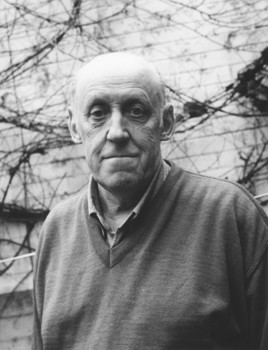
Bo Carpelan. Photo: Charlotta Boucht / Schildts & Söderströms
Bo Carpelan
Mot natten
[Towards the night. Poems 2010]
Helsinki: Schildts & Söderströms, 2013. 69 p.
ISBN 978-951-52-32-20-5
€21, paperback
‘Don’t change, grow deeper ,’ wrote Bo Carpelan: over the years he broadened his poetic range and his personal idiom evolved, but it happened organically, without sudden upheavals of style or idea.
Mot natten (‘Towards the night’) is Carpelan’s last collection of poems. This is underlined by the book’s subtitle, Poems 2010. By then Carpelan (1926–2011) was already marked by the illness that took his life in early 2011. It doesn’t show in the quality of the poems, but knowing it may make it harder for the reader to approach them with unclouded eyes. When a great poet concludes his work one wants to seek a synthesis or a concluding message, and that may encumber one’s reading. So is there such a message? In some ways there is, but Carpelan was not a man of pointed formulations. His ideals emerged without much fuss. More…
Why translate?
28 January 2015 | Essays, Non-fiction
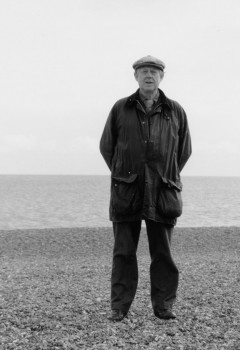
Down by the sea: Herbert Lomas in Aldeburgh. – Photo: Soila Lehtonen
‘People do not read translations to encourage minor literatures but to rediscover themselves in new imaginative adventures‚’ says the poet and translator Herbert Lomas in this essay on translation (first published in Books from Finland 1/1982). ‘Translation is a thankless activity,’ he concludes – and yet ‘you have the pleasure of writing without the agony of primary invention. It’s like reading, only more so. It’s like writing, only less so.’ And how do Finnish and English differ from each other, actually?
Any writer’s likely to feel – unless he’s a star, a celebrity, a very popular and different beast – that the writer is a necessary evil in the publisher’s world, but not very necessary. How much more, then, the translator from a ‘small’ country’s language.
Why do it? The pay’s absurd, you need the time for your own writing, it’s very hard to please people, and translation is, after all, the complacent argument goes, impossible. I’m convinced by all these arguments, and really I can’t afford to go on; but I don’t regret what I’ve done and, looking back, I can find two reasons for translating Finnish writing, one personal, the other cultural. More…
Growing together. New Finnish children’s books
28 January 2011 | Articles

Hulda knows what she wants! From the cover of a new picture book by Markus Majaluoma (see mini reviews*)
What to choose? A mum or dad buys a book hoping it will be an enjoyable read at bedtime – adults presume a book is a ‘good’ one if they themselves genuinely enjoy it, but children’s opinions may differ. Päivi Heikkilä-Halttunen reviews the trends in children’s literature published in Finland in 2010, and in the review section we’ve picked out a handful of the best on offer
Judging by the sheer number and variety of titles published, Finnish children’s and young people’s fiction is alive and well. If I had to describe the selection of books published in 2010 in just a few words, I would have to point to the abundance of titles and subject matters, and the awareness of international trends.
Since 2000 the number of books for children and young people published in Finland each year – including both translated and Finnish titles – has been well in excess of 1,500, and increasing, and this growth shows no signs of slowing down.
Little boys, ten-year-olds who don’t read very much and teenage boys, however, were paid very little attention last year. Although gender-specificity has never been a requirement of children’s fiction, boys are notably pickier when it comes to long, wordy books, especially those that might be considered ‘girly’. More…
Once upon a time…
13 January 2012 | Articles, Non-fiction
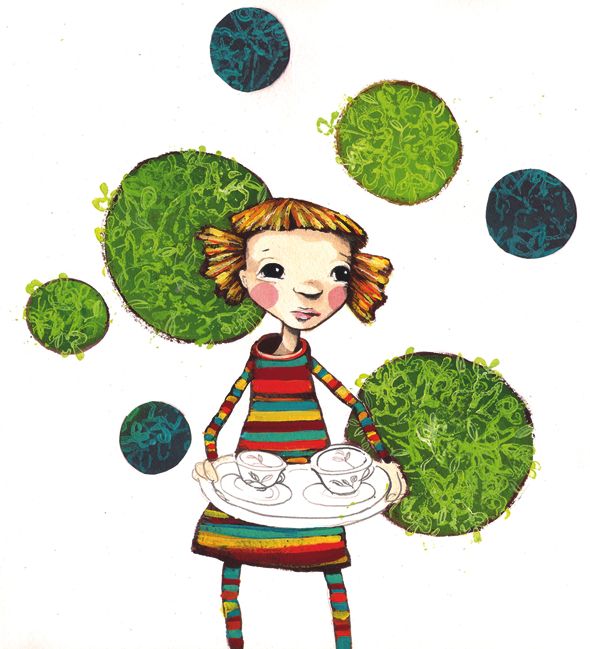
Sari Airola's illustration in Silva och teservisen som fick fötter (‘Silva and the tea set that took to its feet’, Schildts) by Sanna Tahvanainen
The future of book publishing is not easy to predict. Books for children and young people are still produced in large quantities, and there’s no shortage of quality, either. But will the books find their readers? Päivi Heikkilä-Halttunen takes a look at the trends of 2011, while in the review section we’ve picked out a selection of last year’s best titles
The supply of titles for children and young adults is greater than ever, but the attention the Finnish print media pays to them continues to diminish. Writing about this genre appears increasingly ghettoised, featuring only in specialist publications or internet chat rooms and blogs.
Yet, defying the prospect of a recession, Suomen lastenkirjakauppa, a bookshop specialising in children’s literature, was re-established in central Helsinki in autumn 2011, following a ten-year break. Pro lastenkirjallisuus – Pro barnlitteraturen ry, the Finnish society for the promotion of children’s literature, has been making efforts to found a Helsinki centre dedicated to writing and illustration for children. The society made progress in this ambition when it organised a pilot event in May 2011. More…
Findians, Finglish, Finntowns
16 May 2013 | Extracts, Non-fiction
Workers, miners, loggers, idealists, communists, utopians: early last century numerous Finns left for North America to find their fortune, settling down in Michigan, Minnesota, Wisconsin and Ontario. Some 800,000 of their descendants now live around the continent, but the old Finntowns have disappeared, and Finglish is fading away – that amusing language cocktail: äpylipai, apple pie.
The 375th anniversary of the arrival of the first Finnish and Swedish settlers, in Delaware, was celebrated on 11 May. Photographer Vesa Oja has met hundreds of American Finns over eight years; the photos and stories are from his new book, Finglish. Finns in North America

Drinking with the workmen: The Työmies Bar. Superior, Wisconsin, USA (2007)
The Työmies Bar is located in the former printing house of the Finnish leftist newspaper, Työmies (‘The workman’). The owners, however, don’t know what this Finnish word means, or how to pronounce it.
The Työmies Society, which published the newspaper of the same name, Työmies, was founded in Worcester, Massachusetts in 1903 as a socialist organ. It moved to Hancock, Michigan the following year. More…
Future, fantasy and everyday life: books for young readers
24 January 2013 | Articles, Children's books, Non-fiction
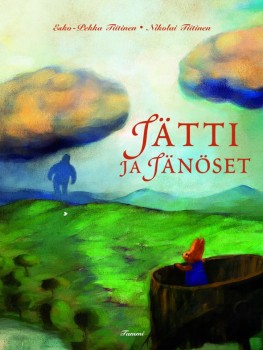
A giant meets the bunnies: a new story by Esko-Pekka Tiitinen, illustrated by Nikolai Tiitinen
Fantasy novels and dystopias feature in the new Finnish fiction for young readers; popular children’s books are recycled – stories and illustrations are adapted to new media and for new age groups. Päivi Heikkilä-Halttunen takes a look at new books for young readers published in 2012
All new mothers in Finland receive a ‘maternity package’ from the state containing items for the baby (including bedding, clothing and various childcare products) intended to give each baby a good start in life. This tradition, which started in 1938, is believed to be the only such programme in the world.
Each package also contains the baby’s first book, traditionally a sturdy board book by a Finnish author. The past few years have seen more original board books published in Finland than ever before: they are doing well in competition alongside books translated from other languages. Board books for babies have become a focus for Finnish illustrators and graphic artists. These books, with their simple visual language, have taken on a retro look.
History was made with the Finlandia Junior award, when for the first time the prestigious prize was given to a picture book originally written in Finland-Swedish: Det vindunderliga ägget (‘A most extraordinary egg’, Schildts & Söderströms) by Christel Rönns. The award can also be seen as an acknowledgement of the brave, experimental Finland-Swedish children’s picture books that are being published these days. Finnish-language picture books, on the other hand, are still crying out for more figures to shake up traditional practices. More…

